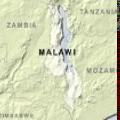Radio Program in Malawi Pushes for Change in Eating Habits
Mwana Alirenji, literally meaning a home of plenty, is a food security radio magazine program aimed at reducing household food shortages. Malawi Broadcasting Corporation airs the program, which covers a number of activities, including village festival campaigns. The Mwana Alirenji team encourages villagers to address the challenges they face in improving food production.
In Malawi, nearly everyone relies on nsima – a thick porridge made from maize flour. It's often the only main dish, and is eaten with meat, fish or beans. All other food is seen as secondary. A family without maize flour is considered hunger stricken.
Faith Phiri is the monitor and evaluation officer for the project. She says attitudes are changing, "During these activities we encourage other foods to be included in their diet. Things like cassava when prepared well with relish and other things can be used to substitute maize food; the same with sweet potato and other crops that we promote in villages." She says the effort mainly targets women, who by tradition have a leading role in the kitchen. As a result, many people are changing their eating habits, including housewife Annie Chepa.
"We used to cook pumpkins, [but always accompanied by the main food, nsima]. [Thanks to the diet diversification program] we [have learned it's OK to eat] rice, cassava, bananas and sweet potatoes alone without relying on nsima." Phiri says the effort could reach more people if there were more financial support, "We have received huge response. There are a lot of people who want to benefit from this project but (we) don't have enough resources. For example, when we want to host the community kitchen (where women are taught modern methods of cooking), we found short of resources [like utensils]" she says. Besides the diet-change programs, the campaign involves encouraging farmers to grow cassava, sweet potatoes, bananas and vegetables which they can also sell to raise income.
Gladson Makowa is the senior producer of the radio program Mwana Alirenji, or Farmer to Farmer.
Makowa says, "We bring in a farmer who is well conversant with a problem or a farmer who overcame the problems. He demonstrates to villagers how he overcomes a particular problem. [His presentation] is recorded and later broadcast to the nation. It turns out almost all the people in Malawi are adopting modern agriculture methods that we promote [and broadcast on the radio program] during these village festivals." Among the methods are new ways of making and using manure and planting maize. They also include the construction of ridges across hillsides that keep crops from washing away with heavy rainfall.
With additional funding from donors, supporters hope the project can be implemented well beyond the 78 villages in which it now operates.
By Lameck Masina Blantyre, Malawi 09 February 2009

